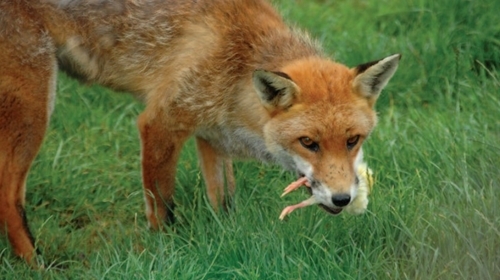
By Matthew Goodall, GWCT Wales Advisor
The Welsh Code of best practice on the use of snares in fox control was created in 2015 to provide guidance to snare users in Wales, with particular emphasis on code-compliant hardware and high consideration for snare placement and associated animal welfare.
Following the launch of the code, stakeholder meetings with Welsh Government took place in subsequent years and in 2017 the National Assembly for Wales published their Report on the use of snares in Wales. The report recommended that if evidence showed a voluntary approach was unsuccessful then legislation could be prepared which should consider similar requirements to those in Scotland, for training and identification and the potential of a licencing system. The report then went on to recommend if reformed enforcement measures do not improve humaneness and efficacy of snare use then Welsh Government should consider legislating to ban the use of snares.
The last stakeholder meeting with Welsh Government was held in 2019, where stakeholders were told that the Minister, Lesley Griffiths was not looking to ban snares at that time, although if inclined she could make the voluntary code a statutory code, with a legal basis.
-----
In December 2020 Welsh Government published the Consultation Document ‘Agriculture (Wales) White Paper’ which proposed to regulate the sale and use of snares in Wales, including an amendment to the Wildlife and Countryside Act 1981 allowing Welsh Ministers to create an identification and licencing regime if they so wished. Interestingly and importantly, there was no mention of an intention to ban the use of snares within that consultation.
On the 21st September 2021 Welsh Government published Our Response and Forward Plan for the Agriculture (Wales) White Paper which stated ‘We will bring forward legislation to amend the Wildlife and Countryside Act 1981 to ban the use of snares and glue traps’. This statement of intent is seemingly based on response to the consultation which included 232 substantive responses and an additional 887 responses submitted through a campaign organised by the League Against Cruel Sports.
It is strange that Welsh Government have seemingly forgotten that a substantive response from any one organisation is submitted to represent their members, and those responses from the countryside and farming organisations represent thousands of members in total.
The GWCT has long advocated the benefits of predation control, producing peer-reviewed scientific publications demonstrating the benefits not only to gamebirds but to a whole host of other wildlife too, including species of conservation concern such as curlew, lapwing, and black grouse.
The code-compliant fox snare, also referred to as the Humane Cable Restraint is one tool in the toolbox of a wildlife manager which is vital to enable the control of foxes in certain habitat types and at key times of the year. There is no other device which is as efficient at enabling the control of foxes in all scenarios, and as such it is vital that those that need to control foxes are able to use a Humane Cable Restraint.
Whilst advancements in thermal imaging and night vision have dramatically improved the efficiency of fox control by rifle, unfortunately vegetation height and habitat type can nullify such methods, often at the most critical time of year through the spring and summer. Whereas cage traps and the Collarum trap can be used, both are more expensive, baited options which are less selective and less effective than the Humane Cable Restraint which relies upon the fox not being able to detect it.
GWCT has consistently showcased the importance of such predation control to policy makers and government officials and as such were involved in the creation of the first snaring code of practice in 2005. Since then, following concerns regarding the efficacy and humanness of snares we designed what is now the code-compliant snare; referred to within the most recent codes of practice, including the Welsh Code of best practice on the use of snares in fox control which was published in 2015.
The device is a restrain and hold device, which (among other improvements) includes a stop fixed at 26cm to avoid strangulation of the caught animal whilst aiding the release of non-target animals. It also includes a breakaway which allows the release of non-target animals. These improvements, combined with the correct placement of the device, have increased both the selectivity and humanness of the device. When tested, the Humane Cable Restraint met the conditions of the international standard for humane restraining traps within the Agreement on International Humane Trapping Standards (AIHTS).
Without such a device available to them, wildlife managers will be severely impeded when undertaking fox control. They will not be able to effectively reduce predation pressure at key times of the year which will impact their livelihoods, whether that by gamebird management or livestock management.
Additionally, it will limit fox control undertaken to protect threatened ground nesting birds such as curlew, which is modelled to have an extinction date as a breeding bird in Wales by 2033. Species such as curlew and black grouse need all the help they can get in Wales and inhibiting those actively working to conserve them seems to be an own goal to say the least.